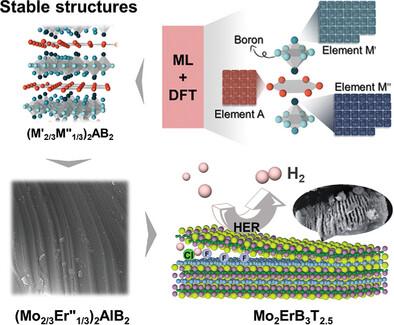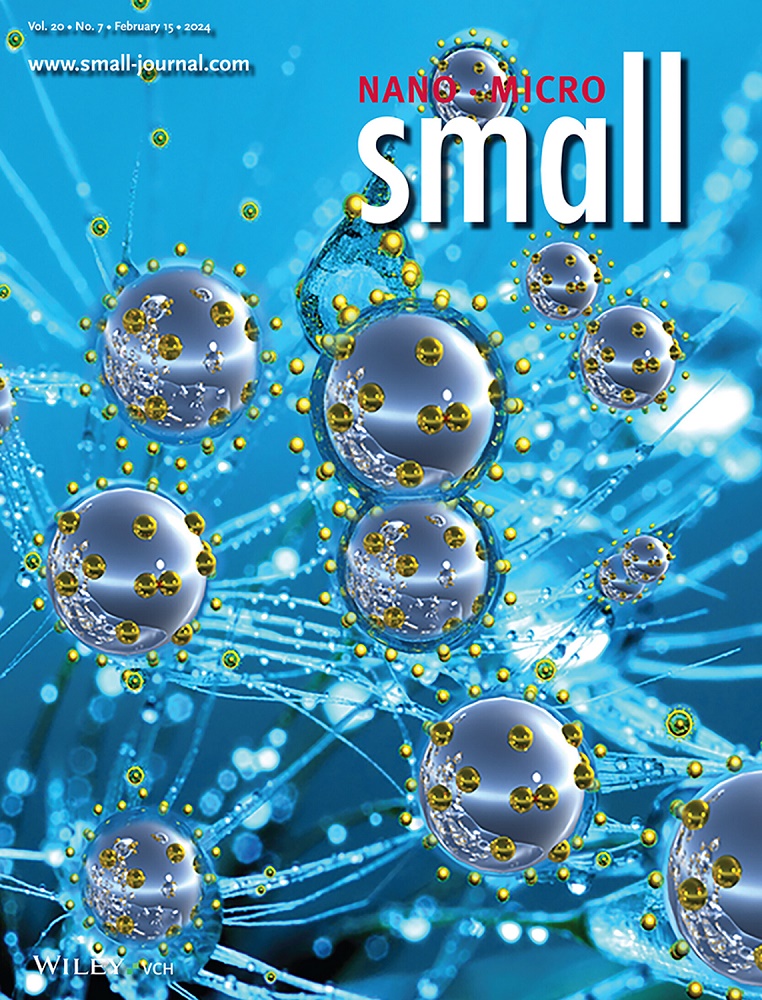Discovery of Bimetallic Hexagonal MBene Mo2ErB3T2.5 (T = O, F, and Cl)
IF 13
2区 材料科学
Q1 CHEMISTRY, MULTIDISCIPLINARY
引用次数: 0
Abstract
Exfoliation from quaternary hexagonal MAB (h-MAB) phases has been suggested as a method for producing 2D in-plane ordered MBenes (i-MBenes) with the general formula (M′2/3M″1/3)2AB2. However, experimental realization of defect-free i-MBenes has not been achieved yet due to the absence of a suitable parent quaternary h-MAB phase. In this study, a machine learning (ML) model is used to predict the stability of 15771 quaternary h-MAB phases generated by considering 33 transition metals for the M site and 16 p-block elements for the A site. Out of these compounds, only 195 are identified as potentially stable. Subsequent high-precision first-principles calculations confirm that 47 of them exhibit both thermodynamic and dynamic stability. Their potential for exfoliation into bimetallic i-MBenes is investigated by bonding analysis. Leveraging these theoretical insights, a bimetallic i-MBene is successfully synthesized, namely 2D Mo2ErB3T2.5 (T = F, Cl and O). Further experimental scrutiny reveals its excellent performance for the hydrogen evolution reaction (HER), highlighting the application potential of bimetallic i-MBenes.

发现双金属六方 MBene Mo2ErB3T2.5(T = O、F 和 Cl)
有人认为,从四元六方 MAB(h-MAB)相剥离是生产通式为(M′2/3M″1/3)2AB2 的二维面内有序 MBenes(i-MBenes)的一种方法。然而,由于缺乏合适的母四元 h-MAB 相,无缺陷 i-MBenes 的实验尚未实现。本研究使用机器学习(ML)模型预测了 15771 个四元 h-MAB 相的稳定性,其中 M 位点考虑了 33 种过渡金属,A 位点考虑了 16 种 p 块元素。在这些化合物中,只有 195 个被确定为潜在稳定化合物。随后进行的高精度第一原理计算证实,其中 47 种化合物具有热力学和动力学稳定性。通过键合分析,研究了它们剥离成双金属 i-MBenes 的潜力。利用这些理论见解,成功合成了一种双金属 i-MBene,即二维 Mo2ErB3T2.5(T = F、Cl 和 O)。进一步的实验研究表明,它在氢进化反应(HER)中表现出色,凸显了双金属 i-MBene 的应用潜力。
本文章由计算机程序翻译,如有差异,请以英文原文为准。
求助全文
约1分钟内获得全文
求助全文
来源期刊

Small
工程技术-材料科学:综合
CiteScore
17.70
自引率
3.80%
发文量
1830
审稿时长
2.1 months
期刊介绍:
Small serves as an exceptional platform for both experimental and theoretical studies in fundamental and applied interdisciplinary research at the nano- and microscale. The journal offers a compelling mix of peer-reviewed Research Articles, Reviews, Perspectives, and Comments.
With a remarkable 2022 Journal Impact Factor of 13.3 (Journal Citation Reports from Clarivate Analytics, 2023), Small remains among the top multidisciplinary journals, covering a wide range of topics at the interface of materials science, chemistry, physics, engineering, medicine, and biology.
Small's readership includes biochemists, biologists, biomedical scientists, chemists, engineers, information technologists, materials scientists, physicists, and theoreticians alike.
 求助内容:
求助内容: 应助结果提醒方式:
应助结果提醒方式:


